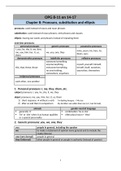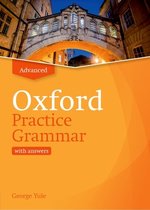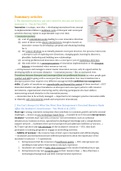OPG 8-11 en 14-17
Chapter 8: Pronouns, substitution and ellipsis
pronouns: used instead of nouns and noun phrases
substitution: used instead of noun phrases, verb phrases and clauses
ellipsis: leaving out words and phrases instead of repeating them
overview pronouns:
personal pronouns generic pronouns possessive pronouns
I, you, he, she, it, we, they
mine, yours, his, hers, its,
me, you, him, her, it, us, we, you, one, they
theirs, ours
them
demonstrative pronouns indefinite pronouns reflexive pronouns
someone/something
anyone/anything, myself, yourself, himself,
this, that, these, those everyone/everything, herself, itself, ourselves,
no one/nothing, yourselves, themselves
somewhere, anywhere
reciprocal pronouns
each other, one another
1. Personal pronouns: I, me, they, them, etc.
subject pronouns: I, you, he, she, it, we, they
object pronouns: me, you, him, her, it, us, them
1) short response without a verb I’m feeling hungry. ~ Me too.
2) after as and than in comparison My brothers are older than me (or I, but formal).
animals gender-neutral language
generally ‘it’ combination ‘he or she’
‘he’ or ‘she’ when it as human qualities often plural noun + ‘they’
or a special personality
2. Generic pronouns: you, we, one, they
you people in general, including the speaker
we to make a statement of opinion more general and to include the
reader/listener
one (very formal) people in general
they (informal) other people in general or people in authority (instead of passive)
1
,3. Possessive pronouns: mine, theirs, etc.
possessive pronouns: mine, yours, his, hers, ours and theirs
instead of possessive noun phrases
answer to ‘Whose?’
use:
1) in of-phrases after noun phrases beginning with determiners/quantifiers
Was Erica a roommate of yours?
2) to talk about non-specific examples rather than specific/unique examples
Sam Piper is a successful artist. A painting of his recently sold for over £10,000.
4. Demonstrative pronouns: this, these, that, those
this/these that/those
things near or closely connected things further away
when we introduce people when we identify people
what is close in time what is further away in time
as determiners before nouns (that woman, those children)
5. Indefinite pronouns: someone, something, etc.
indefinite pronouns: to talk about people and things in a very general way
somebody, nobody, etc. = someone, no one, etc.
someone/something in a positive sentence/question expecting a positive answer
in a negative sentence/open question + when we mean ‘it
anyone/anything
doesn’t matter who or what’
somewhere, anywhere, etc. : indefinite adverbs that are used to talk about places in a non-
specific way
adjectives and ‘else’: after indefinite pronouns and adverbs Do you have anything smaller?
6. Reflexive pronouns: myself, themselves, etc.
reflexive pronouns: used instead of an object pronouns when the object is the same person
or thing as the subject (no possessive form!)
myself, yourself, himself, herself, itself, ourselves, yourselves, themselves
object pronoun instead of reflexive pronoun:
1) after prepositions of place (above, below, beside, etc.) Amy put the bag down beside her.
2) after verbs as ‘bring’ and ‘take’ + with You should take an umbrella with you.
reflexive pronouns for emphasis:
1) after noun phrases and pronouns person/thing You yourself said that he is great!
2) after verb phrases ‘without help’ I repaired the flat tyre myself!
3) after ‘by’ ‘alone’ She lives by herself.
some verbs (shave, shower) usually without reflexive, but added when action is difficult
But since the accident, he can’t shave himself or even dress himself without their help.
2
, 7. Reciprocal pronouns: each other and one another
each other = one another
reciprocal pronouns: used when the same action or feeling goes both ways between two or
more people or things The candidates describe each other.
use:
1) after prepositions The two girls never argued with one other.
2) as possessives They even wore each other’s clothes sometimes.
8. Empty subjects: it and there
it there
empty subject: time, distance and empty subject: with ‘be’ before a noun
weather phrase (+ preposition phrase
it + be place/time)
o before adjective noun phrase decides singular/plural
o before noun + noun clause (informal = plural)
o before noun + gerund/infinitive present/exist? there + be
formal noun clause, gerund or amount/quality? there + be + quantifier
infinitive as subject opinion present/exist = there +
reaction: it + surprise/frighten + object certainly/probably + be
conclusion: it + seem/appear show certainty = there + be + likely/sure
‘liking’ verbs + it + be + noun phrase
find/make/think + it + adj. + clause/inf. not usually passive after there (but
regard/see/view + it + as + clause report, say and think)
after there + be:
o new information: a/an
o familiar information: the/demonstr.
9. Substitution: one, ones, so and do so
one and ones: used instead of repeating countable nouns
plural noun phrases or uncountable nouns some or any
one ones
instead of singular nouns/a noun phrase instead of plural nouns
object in general
(it: specific example of object)
a/an, quantifier only with adjective
the only with adjective or descriptive phrase/clause
demonstrative pronoun or possessive pronoun only with adjective
so: used instead of repeating a clause after some verbs expression opinion or expectations
not after ‘be sure’ and ‘know’
3







